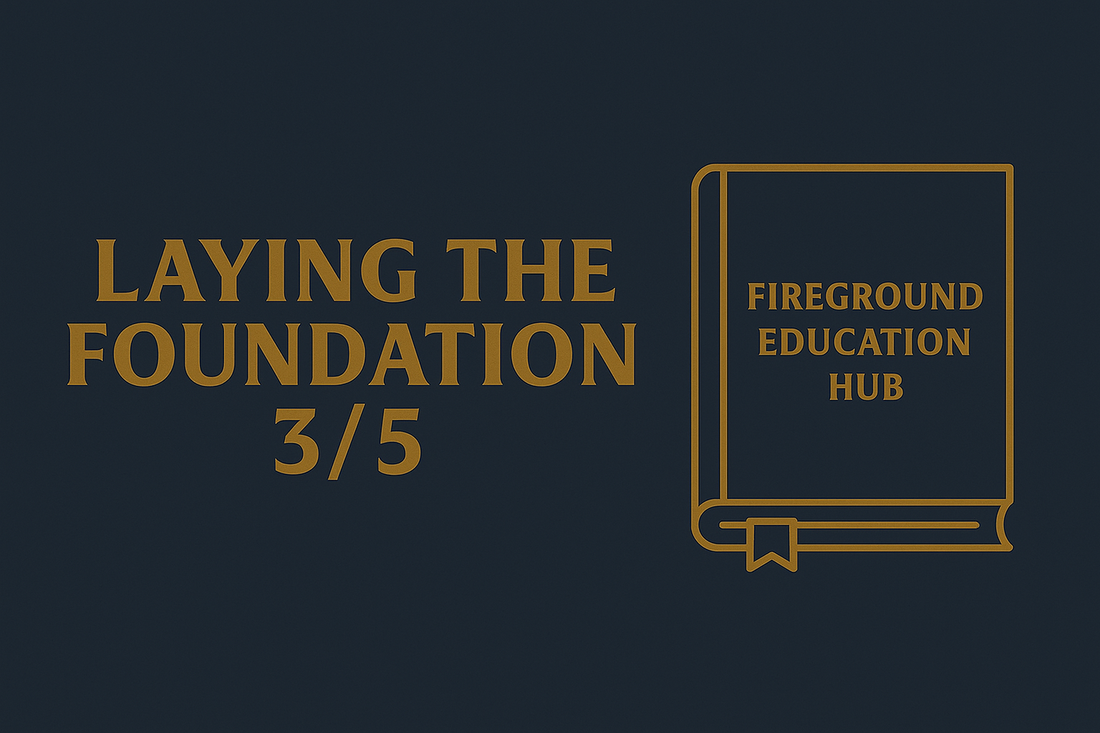
THE FOUNDATION #3 - Breaking Down Your Pay Stub: Where Does Your Money Actually Go?
Share
You Work Long Hours. You’ve Earned That Paycheque.
But Do You Know Where It’s Really Going?
Whether you’re a firefighter in Los Angeles or Toronto, your pay stub tells a story, but most people never read it.
At Fireground Financial, we’ve seen it too many times:
Firefighters who make solid money but feel broke, because they don’t actually know:
- What’s being taken off their cheque
- How much they’re really taking home
- Or how to use that info to build a stronger financial future
Let’s change that right now.
Why Understanding Your Pay Stub Matters
Breaking down your pay stub helps you:
- Take control of your finances
- Avoid surprises at tax time
- Maximize your benefits and pension
- And most importantly, build a real game plan with your actual income, not your fantasy one
Let’s walk through a firefighter pay stub, step by step with comparisons for both U.S. and Canadian crews.
Step 1: Gross Pay
“This is what you earned before deductions.”
Included in Gross Pay:
- Base wage (hourly or salary)
- Overtime pay (time-and-a-half or double time)
- Acting rank or officer premiums
- Stat holiday pay
- Vacation payouts
- Special assignments (wildland, rescue, training)
Your gross income looks impressive. But this number is not the one you build your budget on.
Step 2: Deductions - Where the Real Cuts Begin
Now comes the eye-opener: everything that gets taken off your cheque before you ever see it.
Let’s look at American vs. Canadian deductions side by side.
U.S. FIREFIGHTERS: COMMON DEDUCTIONS
Federal Income Tax
- Taken directly off your cheque
- Rate depends on your income bracket and withholding status (single, married, etc.)
State Income Tax
- Varies by state — Florida or Texas = none; California = up to 13%
Social Security (6.2%) & Medicare (1.45%)
- These are federal programs for retirement and health coverage
- Your employer matches the amount
Pension Contributions (e.g., CalPERS, FRS, etc.)
- Firefighters often pay 8–15% into public safety pension plans
- This is separate from Social Security in some systems
Union Dues
- Usually flat-rate or percentage
- Funds collective bargaining, legal support, etc.
Health Insurance Premiums
- If your department requires you to contribute (varies widely)
- Includes medical, dental, vision
Optional Deductions
- 457(b) or 403(b) retirement savings
- Life insurance
- Charitable giving
- Equipment fees
CANADIAN FIREFIGHTERS: COMMON DEDUCTIONS
Federal & Provincial Income Tax
- Taxed at progressive rates - Alberta = lower; Quebec = higher
- Deducted automatically
Canada Pension Plan (CPP) – 5.95% (2025 rate)
- Your contribution is matched by the employer
- Maxes out once your annual income passes a threshold (~$68,500 in 2025)
Employment Insurance (EI) – 1.66%
- Also capped annually (~$1,050 max contribution)
- Covers you if you’re laid off or injured and not covered by WCB
Municipal/Provincial Pension Plan (e.g., LAPP, OMERS, HOOPP)
- These are your real retirement systems
- Contributions can range from 9–14% of gross pay
- You contribute and your employer matches
Union Dues
- Fixed deduction on every cheque
- May include small charitable contributions
Benefits Premiums
- Usually small ($30–$60 per cheque) if employer-sponsored
- Includes health, dental, life, long-term disability
Optional Deductions
- RRSP through payroll
- Canada Savings Bonds (if still offered)
- Association fees or gym contributions
Step 3: Net Pay - This Is What You Actually Live On
This is the number that hits your bank account.
Let’s compare two fictional paycheques - one American, one Canadian.
U.S. Example (Biweekly Pay – Firefighter in California)
| Description | Amount |
|---|---|
| Gross Pay | $3,500.00 |
| Federal Income Tax | -$420.00 |
| State Income Tax | -$250.00 |
| Social Security | -$217.00 |
| Medicare | -$50.75 |
| Pension Contribution | -$350.00 |
| Union Dues | -$40.00 |
| Health Insurance | -$80.00 |
| Net Pay | $2,092.25 |
Canada Example (Biweekly Pay – Firefighter in Alberta)
| Description | Amount |
|---|---|
| Gross Pay | $3,500.00 |
| Federal/Prov Tax | -$450.00 |
| CPP (5.95%) | -$208.25 |
| EI | -$58.10 |
| LAPP Pension | -$420.00 |
| Union Dues | -$38.00 |
| Benefits | -$45.00 |
| Net Pay | $2,280.65 |
Firefighter Reality Check
You're not really taking home your “full” pay. You're taking home 60–70% of it.
That’s not bad.
But if you don’t know that number, you might:
- Over-spend
- Under-save
- Miscalculate how much you can actually invest or pay off in debt
What You Can Do Right Now
1. Get Clear on Your Net Pay
Use the last three paycheques to find your average net income.
Base your budget on this, not your salary.
2. Review Your Pension Contributions
Log into your pension portal and track your growing retirement benefit.
This is part of your long-term net worth.
3. Audit Your Optional Deductions
If you’re paying for extras (like insurance or gym fees), make sure they still serve your goals.
4. Download Our Free Tool
[Check out our Fireground Financial Worksheets]
Plug in your own numbers. See exactly what’s going where.
Next, we will learn how to build a solid budget.
